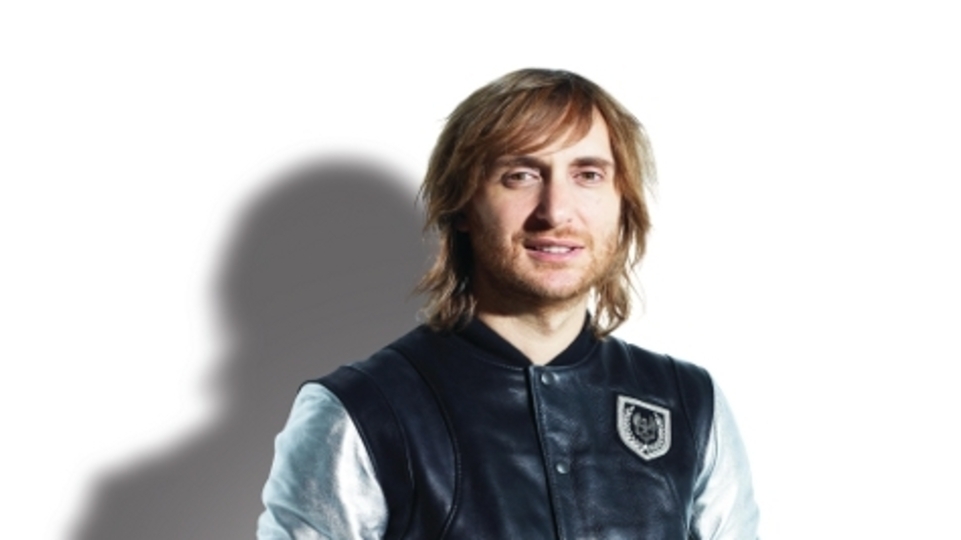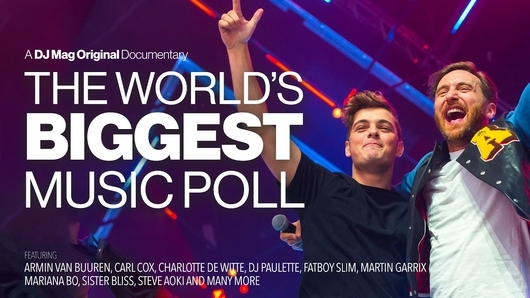
When we track down David Guetta in Paris, he's already been told by his manager about his Top 100 victory.
"I'm very happy of course, I was thinking it was going to be impossible for anybody to replace Armin Van Buuren as No.1," he chuckles. "I don't know how many years trance DJs have been No.1?"
DJmag informs David that it's been almost a decade of trancers at the top, with Armin (four years), Paul van Dyk (twice) and Tiësto (three times) dominating in the noughties. So lots of people in house music and elsewhere may well be pleased, we suggest, that you've broken the trance…
"The curse?" he interjects, laughing. "No really, I have a lot of respect for what those guys have done. But I'm happy for myself, and also think that maybe it gives hope to a lot of DJs playing house and electro."
Winning the Top 100 really does mean a lot to the Frenchman. "I've had amazing success as a producer, but I always saw myself first of all as a DJ," Guetta drawls. "So in the same way that I made a double album where one disc is pop and the other electronic, it's also very important for me. As much as I want to speak to a wider audience, I still want to speak to my original audience - the clubbers, party people and the DJs. Those who encouraged me, and are my roots."
Does winning the Top 100 mean more than having a No.1 hit single in America? "Yes it does, because for me it makes me more happy to play an amazing club gig than it does to sell a lot of records," he says. "Of course I love making music, but DJ culture is everything to me - it's been my life for so many years."
It has been an incredible last few years for Guetta, who first started DJing in Paris in the mid-1980s at the age of 17 - pre-house music.
"When I was 17, all my friends were going to clubs because they wanted to pick up girls," he recalls. "I didn't care, I was going to clubs because I wanted to listen to the DJ."
He was a DJ and promoter in and around Paris during the '80s and '90s before moving up some levels when he released 'Just A Little More Love' in 2001, featuring US gospel singer Chris Willis. The club hits and albums kept coming in the noughties, as did the 'Fuck Me I'm Famous' compilations - named after his parties in Ibiza - that became a self-fulfilling prophecy.
Electro house track 'Love Is Gone' (also with Chris Willis on vocals) was massive for him in 2007, although in the US it wasn't on the radio much, as mainstream American radio stations didn't play dance music. "But it was being played in every club - not only house music clubs, but even in clubs that would only normally play hip-hop," Guetta tells DJmag. "So a lot of urban artists knew that record, without knowing who I was or who Chris Willis was."
Up until this point, Guetta was making music that he wanted to play as a DJ, "but then musically I started wanting to not only give that physical reaction due to production tricks and how phat the beat is, but also an emotional reaction that comes from chord progressions and melodies," he says. "When I started to make songs, I loved it and wanted to grow more in that direction."
It just so happened that former Destiny's Child singer - and now UK X-Factor judge - Kelly Rowland was in a club in America when Guetta was playing an instrumental version of what became 'When Love Takes Over', and she asked him if she could sing on it. The same week, will.i.am called him to ask if he would produce some records for the Black Eyed Peas, because they loved 'Love Is Gone' so much. "So I sent them a few beats, and the track became 'I Got A Feeling'," he relays.
Soon after, he met Akon at a BBC Radio 1 event and they hooked up to do 'Sexy Bitch'. "What was interesting is that all of those people thought they would go and do something with David because they love his music, but they never thought it could be really big in America," he says.
Mainstream US radio didn't play dance music, but these releases battered down the doors. All three of these records were massive everywhere on release in 2009 (including in the US), and Guetta became the go-to guy for US urban artists to hook up some dope dance beats.
"Because I worked with people that were a 'brand' in the US, they gave us a chance," Guetta believes. "They played it on the radio and they realised that people loved it. They started to realise that the culture was big amongst young people, it was like the new sound in America and everybody started calling me.
"American journalists say to me now 'You've brought this culture to America', and I say, 'No, this culture was BORN in America, what are you talking about?'" he continues. "The media had refused to see the culture."
Guetta broke down the doors in America, and the whole dance scene internationally is benefiting. "It's been a real revolution," he declares, "everything is changing. Our sound is taking over the planet."
David tells DJmag that he is happy that a lot of other big DJ/producers are working with big urban artists now. "Music belongs to everybody, I'm not like 'Oh, now other people are doing what I was doing', for me music does not belong to anyone," he says. "I'm happy that I've been opening doors.
"For so many years we haven't been getting the respect we deserve from the media, the radio, the TV," he continues. "I think it's amazing that it's happening now, I'm really happy - not just for me, but for everyone. Even the trance DJs!"
He may have his detractors, but there's no doubt that Guetta's explosion into the mainstream has had a knock-on effect for all of dance music. "People are adding their flavours and it's coming back to Europe. It's a very interesting creative circle that is happening these last few years," he believes. "It's a very positive thing that doesn't only benefit people like me who are also producing pop records, it also benefits the underground, which is great.
"Our music is so big at the moment, as simultaneously there are people like me and Tiësto and the Swedish House Mafia who are really crossing over, and at the same time you have this crazy underground scene that is exploding also," he continues. "The fact that there are so many creative people on this level at the moment makes our music very strong."
Guetta has just released his fifth album, 'Nothing But The Beat', and DJmag asks him about a couple of the tracks on the electronic disc - 'The Alphabeat' and 'Toy Story' - that have that Daft Punk/Justice sound. He reveals that Thomas Bangalter from Daft Punk really helped him out when he called Virgin Records a decade ago to tell them to sign Guetta's 'Just A Little More Love', as he thought it was really good.
"He was coming to my club when I was playing, and I was looking at him like he was God - I still do, actually," he says. "But at the time, I was working hard to sound totally not French. I wanted to be different, but now that a long time has passed I think maybe I can sound French and it is OK."
We then ask him if he considers his track with Swedish hotshot Avicii to be 'trouse', but he says he doesn't really recognise trouse as a genre.
"Genres for me aren't so important," he says. "I understand what you mean - bringing the melodic side of trance and putting it into a house music groove, it probably speaks to an even wider audience.
"What's interesting is that everything is mixing together - lots of DJs have hip-hop influences, trance influences, house influences, electro… and the kids don't even care, because it's the internet generation, people listen to all sorts of music," Guetta continues. "It's perfect for me because I was always very open-minded, listening to lots of other people's different stuff, and as much as I was never into trance I appreciated the melodic side of it, the chord progressions - it's emotional music. That part of that music I always thought was really good, but I didn't like the drums and the bassline."
The duality between the pop charts and the underground dance scene doesn't faze David. "In Ibiza, my parties are a mix of people, but underground culture is the mainstream culture there, and I wish it was like this everywhere on the planet," he says. "We're on the way."
Citing 2ManyDJs, one of his regular guests at the FMIF parties, as a good example of somebody playing "the most underground acid house record and then the biggest pop record - because they just want to play good music, and have fun," he then adds: "It's a party! I don't take myself too seriously. I don't need to have a day for pop music and a day for club music - it's the same person. I just wanna have fun, give people a good time, and make good music.
